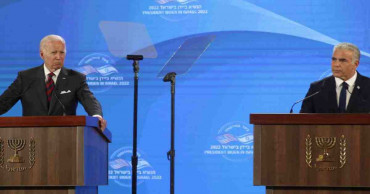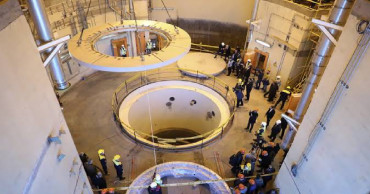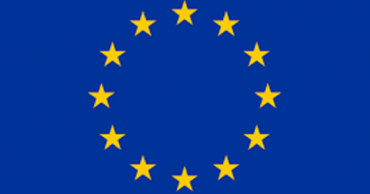Iran nuclear deal
Biden says US won’t wait ‘forever’ for Iran on nuclear deal
President Joe Biden said Thursday that the United States is “not going to wait forever” for Iran to rejoin a dormant nuclear deal, a day after saying he’d be willing to use force against Tehran as a last resort, if necessary.
At a news conference with Israeli Prime Minister Yair Lapid following private talks about Iran’s rapidly progressing nuclear program, Biden said the U.S. had laid out for the Iranian leadership a path to return to the nuclear deal and was still waiting for a response.
“When that will come, I’m not certain,” Biden said. “But we’re not going to wait forever.”
Even as he suggested that his patience with Iran was running low, Biden held out hope that Iran can be persuaded to rejoin the agreement. “I continue to believe that diplomacy is the best way to achieve this outcome,” he said.
Biden’s desire for a diplomatic solution contrasted with Lapid, who said Iran must face a real threat of force in order to give up on its nuclear ambition.
“The Iranian regime must know that if they continue to deceive the world they will pay a heavy price,” Lapid said at the news conference. “The only way to stop them is to put a credible military threat on the table.”
Lapid suggested that he and Biden were in agreement, despite his tougher rhetoric toward Iran.
“I don’t think there’s a light between us,” he said. “We cannot allow Iran to become nuclear.”
Resurrecting the Iran nuclear deal brokered by Barack Obama’s administration and abandoned by Donald Trump in 2018 was a key priority for Biden as he entered office. But administration officials have become increasingly pessimistic about the chances of getting Tehran back into compliance.
Israeli officials have sought to use Biden’s first visit to the Middle East as president to underscore that Iran’s nuclear program has progressed too far and encourage the Biden administration to scuttle efforts to revive a 2015 agreement with Iran to limit its development.
Read: Sri Lankan President Rajapaksa arrives in Singapore
Israel opposed the original nuclear deal, reached under Obama in 2015, because its limitations on Iran’s nuclear enrichment would expire and the agreement didn’t address Iran’s ballistic missile program or military activities in the region.
Instead of the U.S. reentering the deal, which Trump withdrew from in 2018, Israel would prefer strict sanctions in hopes of leading to a more sweeping accord.
The U.S. president, who is set to travel to Saudi Arabia on Friday, said he also stressed to Lapid the importance of Israel becoming “totally integrated” in the region.
Their one-on-one talks marked the centerpiece of a 48-hour visit by Biden aimed at strengthening already tight relations between the U.S and Israel. The leaders issued a joint declaration emphasizing military cooperation and a commitment to preventing Iran, which Israel considers an enemy, from obtaining a nuclear weapon.
In the joint statement, the United States said it is ready to use “all elements of its national power” to prevent Iran from obtaining a nuclear bomb.
Biden, in an interview with Israel’s Channel 12 that aired Wednesday, offered strong assurances of his determination to stop Iran from becoming a nuclear power, saying he’d be willing to use force as a “last resort” if necessary.
Iran announced last week that it has enriched uranium to 60% purity, a technical step away from weapons-grade quality.
The joint declaration could hold important symbolic importance for Biden’s upcoming meeting with Arab leaders in Saudi Arabia as he seeks to strengthen a regionwide alliance against Iran.
“I talked about how important it was … for Israel to be totally integrated in the region,” Biden said after his one-on-one meeting with Lapid on Thursday.
The president heads to Saudi Arabia after calling the kingdom a “pariah” nation as a candidate and releasing a U.S. intelligence finding last year that showed the kingdom’s defacto leader, Mohammed bin Salman, like approved the killing of of Jamal Khashoggi, a U.S.-based writer.
Biden declined to commit to mentioning Khashoggi’s murder when he meets with the crown prince.
“I always bring up human rights,” Biden said at the news conference. “But my position on Khashoggi has been so clear. If anyone doesn’t understand it, in Saudi Arabia or anywhere else, then they haven’t been around for a while.” He did not reiterate his position.
3 years ago
Progress noted at diplomats’ talks on Iran nuclear deal
High-ranking diplomats from China, Germany, France, Russia and Britain made progress at talks Saturday focused on bringing the United States back into their landmark nuclear deal with Iran, but said they need more work and time to bring about a future agreement.
After the meeting, Russia’s top representative, Mikhail Ulyanov, tweeted that members of the Joint Comprehensive Plan of Action, or JCPOA, “noted today the indisputable progress made at the Vienna talks on restoration of the nuclear deal.”
“The Joint Commission will reconvene at the end of the next week,” Ulyanov wrote. “In the meantime, experts will continue to draft elements of future agreement.”
The U.S. did not have a representative at the table when the diplomats met in Vienna because former President Donald Trump unilaterally pulled the country out of the deal in 2018. Trump also restored and augmented sanctions to try to force Iran into renegotiating the pact with more concessions.
U.S. President Joe Biden wants to rejoin the deal, however, and a U.S. delegation in Vienna was taking part in indirect talks with Iran, with diplomats from the other world powers acting as go-betweens.
The Biden administration is considering a rollback of some of the most stringent Trump-era sanctions in a bid to get Iran to come back into compliance with the nuclear agreement, according to information from current and former U.S. officials and others familiar with the matter.
Ahead of the main talks, Ulyanov said JCPOA members met on the side with officials from the U.S. delegation but that the Iranian delegation was not ready to meet with U.S. diplomats.
The nuclear deal promised Iran economic incentives in exchange for curbs on its nuclear program. The reimposition of U.S. sanctions has left the Islamic Republic’s economy reeling. Tehran has responded by steadily increasing its violations of the restrictions of the deal, such as increasing the purity of uranium it enriches and its stockpiles, in a thus-far unsuccessful effort to pressure the other countries to provide relief from the sanctions.
The ultimate goal of the deal is to prevent Iran from developing a nuclear bomb, something it insists it doesn’t want to do. Iran now has enough enriched uranium to make a bomb, but nowhere near the amount it had before the nuclear deal was signed.
The Vienna talks began in early April and have included several rounds of high-level discussions. Expert groups also have been working on how to resolve the issues around the American sanctions and Iranian compliance, as well as the “possible sequencing” of the U.S. return.
Outside the talks in Vienna, other challenges remain.
An attack suspected to have been carried out by Israel recently struck Iran’s Natanz nuclear site, causing an unknown amount of damage. Tehran retaliated by beginning to enrich a small amount of uranium up to 60% purity, its highest level ever.
4 years ago
US demand for Iran sanctions could trigger UN crisis
The United States is poised to call for the United Nations to reimpose sanctions on Iran under a rarely used diplomatic maneuver after a resounding defeat in the Security Council.
5 years ago
Flaring tensions could kill Iran nuclear deal; to what end?
The landmark 2015 deal between Tehran and world powers aimed at preventing Iran from obtaining nuclear weapons has been teetering on the edge of collapse since the United States pulled out unilaterally in 2018. The European Union says it will "spare no effort" to keep the deal alive, but with tensions between the U.S. and Iran escalating into open hostilities it seems increasingly unlikely that will be possible.
6 years ago
EU countries say Iran nuclear deal fundamental to regional, int'l peace
Six UN Security Council members from the European Union (EU) on Thursday said the Iran nuclear agreement is fundamental to regional and international peace and security and called for its fulfillment.
6 years ago

.jpg)
.jpg)




